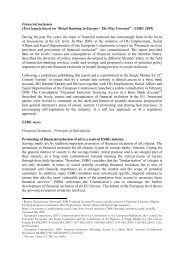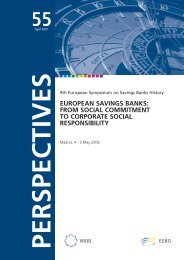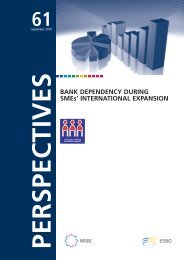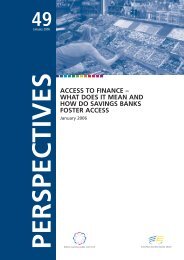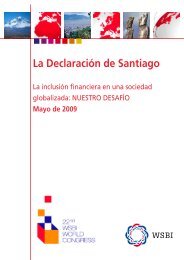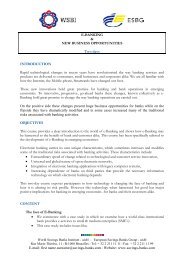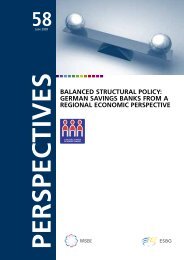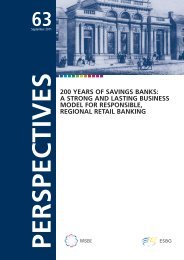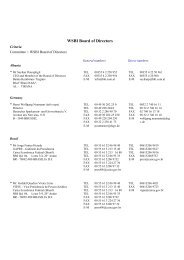A comparative analysis of the US and EU retail banking markets - Wsbi
A comparative analysis of the US and EU retail banking markets - Wsbi
A comparative analysis of the US and EU retail banking markets - Wsbi
Create successful ePaper yourself
Turn your PDF publications into a flip-book with our unique Google optimized e-Paper software.
■ Best execution<br />
Investor protection is fur<strong>the</strong>r upheld by <strong>the</strong> rules on<br />
best execution. This concept represents a major<br />
change, especially in those Member States that<br />
previously used <strong>the</strong> concentration rule, where best<br />
execution in practical terms meant simply<br />
transmitting <strong>the</strong> order to <strong>the</strong> national exchange.<br />
Now, <strong>the</strong> best execution rule obliges Member States<br />
to “require that investment firms take all reasonable<br />
steps to obtain, when executing orders, <strong>the</strong> best<br />
possible result for <strong>the</strong>ir clients taking into account<br />
price, costs, speed, likelihood <strong>of</strong> execution <strong>and</strong><br />
settlement, size, nature or any o<strong>the</strong>r consideration<br />
relevant to <strong>the</strong> execution <strong>of</strong> <strong>the</strong> order” 230 .<br />
Investment firms must analyse <strong>the</strong> importance <strong>of</strong><br />
<strong>the</strong>se factors according to <strong>the</strong>ir clients needs <strong>and</strong> on<br />
that basis seek <strong>the</strong> execution venue that <strong>of</strong>fers <strong>the</strong><br />
best execution conditions. A list <strong>of</strong> venues which <strong>the</strong><br />
investment firm has access to <strong>and</strong> <strong>the</strong> factors<br />
affecting such choice must be pre-defined in <strong>the</strong><br />
order execution policies <strong>of</strong> each investment firm<br />
<strong>and</strong> pre-approved by <strong>the</strong> clients. As stated above,<br />
MiFID acknowledges that not all clients have equal<br />
knowledge about investment services <strong>and</strong> products.<br />
To this end, best execution requirements are even<br />
more stringent when orders are executed on behalf<br />
<strong>of</strong> a <strong>retail</strong> client. In such cases, investment firms are<br />
obliged to consider both <strong>the</strong> price <strong>of</strong> <strong>the</strong> financial<br />
instrument <strong>and</strong> all <strong>the</strong> costs associated with <strong>the</strong><br />
execution 231 .<br />
■<br />
Transparency<br />
The MiFID introduced new requirements on systematic<br />
internalisers, MTFs <strong>and</strong> regulated <strong>markets</strong> to increase<br />
pre-trade transparency as well as requirements on all<br />
trading venues to increase post-trade transparency.<br />
These provisions currently apply only to trading<br />
<strong>of</strong> shares, but <strong>the</strong>re is a possibility that <strong>the</strong> rules<br />
would be extended to o<strong>the</strong>r financial instruments at<br />
a later stage.<br />
Pre-trade transparency requirements oblige regulated<br />
<strong>markets</strong>, MTFs <strong>and</strong> systematic internalisers to publish<br />
prices at which <strong>the</strong>y are willing to trade <strong>and</strong> keep<br />
<strong>the</strong>m up to date during working hours 232 . This is a<br />
complete novelty as regards <strong>the</strong> systematic<br />
internalisers, which were not subject to any similar<br />
rules prior to <strong>the</strong> introduction <strong>of</strong> <strong>the</strong> MiFID. The end<br />
<strong>of</strong> <strong>the</strong> concentration rule implies that <strong>the</strong> stock<br />
exchanges will face increasing competition from<br />
MTFs <strong>and</strong> systematic internalisers <strong>and</strong> it is <strong>the</strong>refore<br />
necessary to impose similar rules on all execution<br />
venues <strong>and</strong> <strong>the</strong>reby create a level playing field<br />
between <strong>the</strong>m. The widened scope <strong>of</strong> pre-trade<br />
transparency is also expected to contribute to price<br />
discovery as investors will have a better overview <strong>of</strong><br />
<strong>the</strong> market liquidity.<br />
All trading venues (regulated <strong>markets</strong>, MTF <strong>and</strong> all<br />
investment firms) became also subject to post-trade<br />
transparency requirements <strong>of</strong> <strong>the</strong> MiFID. Under this<br />
concept, <strong>the</strong>y must make public <strong>the</strong> volume <strong>and</strong><br />
price <strong>of</strong> those transactions <strong>and</strong> <strong>the</strong> time at which<br />
<strong>the</strong>y were concluded, as close to real-time as<br />
possible 233 . In principle, a maximum limit to disclose<br />
this information is three minutes, but certain<br />
exceptions will be allowed for block-size trades<br />
which require longer periods in order to avoid<br />
market disruption.<br />
4.3.4 Comparison<br />
Significant regulatory changes in <strong>the</strong> securities <strong>markets</strong> field<br />
are currently being implemented in both in <strong>the</strong> <strong>US</strong> <strong>and</strong> <strong>the</strong><br />
<strong>EU</strong>. The <strong>US</strong> is preparing to modernise its National Market<br />
System, while <strong>the</strong> <strong>EU</strong> is preparing to implement <strong>the</strong> MiFID.<br />
The main objectives <strong>of</strong> both <strong>the</strong> Regulation NMS <strong>and</strong> <strong>the</strong><br />
MiFID are ra<strong>the</strong>r similar: to improve <strong>the</strong> functioning <strong>of</strong> <strong>the</strong><br />
financial <strong>markets</strong> <strong>and</strong> to increase <strong>the</strong> protection <strong>of</strong> investors.<br />
The respective authorities have already adopted both <strong>the</strong><br />
Regulation NMS <strong>and</strong> <strong>the</strong> MiFID, <strong>the</strong> former entering into<br />
force in autumn 2006 <strong>and</strong> <strong>the</strong> latter in autumn 2007.<br />
Nei<strong>the</strong>r <strong>of</strong> <strong>the</strong> two legislative frameworks is a complete<br />
novelty (<strong>the</strong> Regulation NMS is based on <strong>the</strong> main ideas <strong>of</strong><br />
National Market System that has been developing since<br />
1975, whereas <strong>the</strong> MiFID is in fact a revision <strong>of</strong> <strong>the</strong> 1993<br />
ISD), but both introduced a number <strong>of</strong> key rules that are<br />
expected to have a significant influence on <strong>the</strong> industry.<br />
230 Article 21(1) <strong>of</strong> <strong>the</strong> MiFID.<br />
231 Associated costs that could occur could be various commissions, fees, taxes, exchange fees, etc, charged by various intermediaries involves in <strong>the</strong> transaction,<br />
but not <strong>the</strong> firm’s internal charges (as envisaged by <strong>the</strong> Commission’s background note <strong>of</strong> <strong>the</strong> draft Commission implementing Directive).<br />
232 Articles 27, 29 <strong>and</strong> 44 <strong>of</strong> <strong>the</strong> MiFID.<br />
233 Articles 28, 30 <strong>and</strong> 45 <strong>of</strong> <strong>the</strong> MiFID.<br />
72



